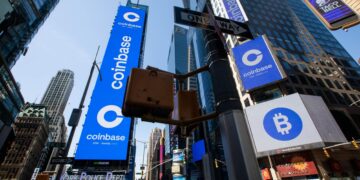Topline
Despite record waves of deal activity and massive fanfare leading up to their public-market debuts, a slew of companies that dominated headlines ahead of initial public offerings in the last two years have become some of this year’s biggest stock market losers—exemplifying investors’ growing skepticism toward speculative, and often unprofitable, firms as stocks post one of the worst starts to a year ever.
Formerly high-flying firms are plunging amid the Fed’s looming interest rate hikes and “investor … [+]
© 2021 Bloomberg Finance LP
Key Facts
The $400 million Renaissance IPO ETF, which tracks more than 100 of the largest recently listed U.S. IPOs, has plunged 25% so far this month—yielding staggering losses amid a broad market sell-off that has pushed the S&P 500 and tech-heavy Nasdaq down about 10% and 13%, respectively.
Ride-hailer Uber Technologies, the fund’s biggest holding, is also among one of the hardest-hit stocks, plummeting 21% this year to $34.50—well below an offering price of $45 set for its IPO in May 2019.
It’s not much better for the rest of the fund’s top five holdings: Software firms Snowflake, Zoom Video Communications, Crowdstrike and Datadog have all tanked between 17.5% and 22% apiece this year—reversing massive gains during the pandemic’s early days that helped the tech-heavy Nasdaq skyrocket 44% in 2020 and 21% last year.
“Investors have left the SPACs, meme stonks and profitless IPOs [like Crowdstrike, Datadog and Snowflake] that soared in the past two years for the perceived safety of tech giants,” analyst Vincent Deluard of financial services firm StoneX wrote in a Wednesday email, pointing out the performance of firms like Microsoft and Apple is more in line with the broader market.
SPACs, or special purpose acquisition companies, represented about 60% of U.S. IPOs last year, according to Bank of America analysts; the Defiance Next-Gen SPAC Derived ETF, which tracks SPACs both before and after they acquire private companies to take public, has fallen 17% this year.
In a note to clients last week, Bank of America analysts blamed the Federal Reserve’s impending interest rate hikes, a “historically extreme” proportion of profitless early stage companies and “some investor fatigue” around so many new companies for the poor IPO performance.
Crucial Quote
“The market quickly shifted away from risk and toward quality, hurting many of the small cap IPOs and those that have a long roadmap to profitability,” Bank of America’s Thomas Thornton and Jill Carey Hall wrote on Friday. “That shift and the resulting selloff in shares suggests opportunity, particularly for those investors able to take a medium to long-term view.”
Tangent
Bank of America suggests investors seek out firms that are beating sales expectations if they want to nab better-than-expected returns from recently public firms. Among 2021 IPOs, just over 50% beat revenue numbers in the four quarters following the IPO, the analysts note. After the latest stock plunge, the bank’s top IPO picks include software firm UiPath and online financial marketplace NerdWallet, which have fallen about 51% each since IPOs last year but are posting promising revenue growth of 58% and 92%, respectively.
Key Background
A record 1,100 companies went public on U.S. exchanges last year and raised close to $260 billion. Cryptocurrency exchange Coinbase and Tesla rival Rivian were among firms captivating investors and skyrocketing on their first day of trading, but now they’ve plunged about 50% and 65% from record highs. It’s even worse for buzzy online brokerage Robinhood, which has plummeted 84% since an IPO in July. The poor post-IPO performance “isn’t a new trend,” Ally Invest Chief Markets Strategist Lindsey Bell said earlier this month, noting half of U.S. companies that went public between 2015 and 2019 were trading below their IPO prices one year later. So far this year, private equity giant TPG has been the biggest firm to list publicly. The Nasdaq-listed shares surged 15% on TPG’s first day of trading, but has since fallen nearly 6%.
What To Watch For
Despite the recently dismal post-IPO performance, a number of big names are still slated to debut on public markets this year. Social media giant Reddit is targeting a valuation of more than $15 billion for an IPO as soon as March, and vegan-friendly burger-maker Impossible Foods is reportedly eyeing a $10 billion valuation in an IPO CEO Pat Brown says is “inevitable.”
Further Reading
The Biggest IPOs To Watch In 2022 (Forbes)
Maker Of $295 Prescription Video Game For Kids With ADHD To Go Public In Palihapitiya-Led SPAC Deal (Forbes)
‘Catastrophic’ Stock Market Crash Isn’t Over—Here’s How Much Worse It Could Get (Forbes)




